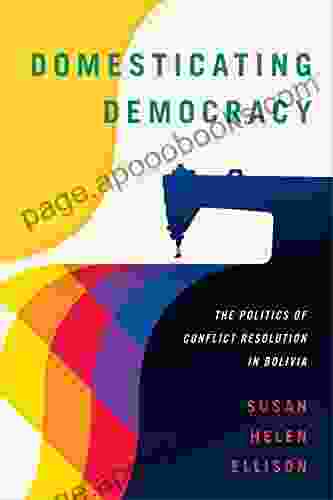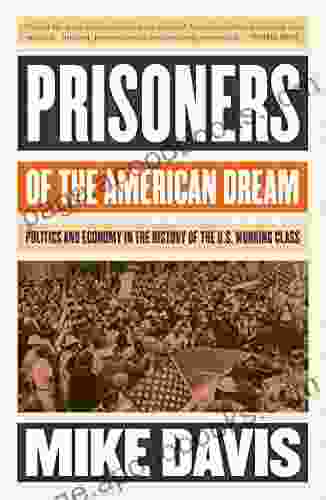Unveiling the Intricate Politics of Conflict Resolution in Bolivia: A Comprehensive Guide

5 out of 5
| Language | : | English |
| File size | : | 18005 KB |
| Text-to-Speech | : | Enabled |
| Enhanced typesetting | : | Enabled |
| Word Wise | : | Enabled |
| Print length | : | 296 pages |
| Screen Reader | : | Supported |
| Item Weight | : | 1.32 pounds |
| Paperback | : | 528 pages |
| Dimensions | : | 5.59 x 1.02 x 8.86 inches |
Bolivia, a landlocked country in the heart of South America, has a rich and complex history marked by both conflict and resolution. From the indigenous uprisings of the colonial era to the modern-day struggles for social justice and economic equality, Bolivia has been a crucible of political struggle and negotiation.
The Politics of Conflict Resolution in Bolivia, a seminal work by renowned scholar Dr. Carlos Mesa Gisbert, provides a comprehensive analysis of the political landscape of Bolivia, and the various factors that have shaped the country's history of conflict and resolution. Drawing on extensive research and firsthand experience, Dr. Mesa Gisbert offers a nuanced and insightful account of the political dynamics that have played out in Bolivia over the centuries.
Historical Roots of Conflict
To understand the politics of conflict resolution in Bolivia, it is essential to delve into the country's historical roots. Bolivia has a long history of indigenous resistance to colonial rule, beginning with the Aymara and Quechua uprisings in the 18th century. These uprisings were brutally suppressed by the Spanish colonial authorities, but they laid the groundwork for the future independence movement.
After Bolivia gained independence in 1825, the country faced a series of internal conflicts and political instability. The 19th century was marked by a succession of authoritarian governments and military coups. These conflicts often stemmed from deep-seated social and economic divisions, including the exploitation of indigenous communities and the concentration of wealth and power in the hands of a small elite.
The 20th Century: Revolution and Reform
The 20th century was a period of both great turmoil and significant progress in Bolivia. The Bolivian National Revolution of 1952 brought about major social and economic reforms, including the nationalization of the country's tin mines and the implementation of universal suffrage. However, the revolution also led to a period of political instability and violence.
In the latter half of the 20th century, Bolivia experienced a series of military dictatorships and democratic governments. During this period, the country faced challenges such as economic inequality, social unrest, and the rise of indigenous movements.
Conflict Resolution in the 21st Century
The 21st century has brought new challenges and opportunities for Bolivia. In 2006, Evo Morales became the first indigenous president of Bolivia. Morales' government implemented a number of progressive policies, including the nationalization of the country's natural gas industry and the expansion of social welfare programs. However, Morales' presidency was also marked by political polarization and the suppression of dissent.
In 2019, Morales resigned from office amid widespread protests over alleged electoral fraud. A new government led by Jeanine Áñez took power and oversaw a period of political transition. In 2020, Luis Arce, a member of Morales' party, was elected president.
Factors Shaping Conflict and Resolution
The Politics of Conflict Resolution in Bolivia identifies a number of factors that have shaped the country's history of conflict and resolution. These factors include:
- Historical legacies: Bolivia's history of colonialism, indigenous resistance, and political instability has left a lasting impact on the country's political landscape.
- Social and economic inequality: Bolivia is one of the most economically unequal countries in South America. This inequality has been a major source of social tension and conflict.
- Indigenous rights: Bolivia has a large indigenous population, and indigenous rights have been a major issue in the country's politics.
- Natural resources: Bolivia is rich in natural resources, including gas, oil, and minerals. The exploitation of these resources has been a source of both wealth and conflict.
- Political institutions: Bolivia has a complex and often fragile political system. The weakness of political institutions has made it difficult to resolve conflicts peacefully.
Lessons for the Future
The Politics of Conflict Resolution in Bolivia offers valuable lessons for the future. The book demonstrates the importance of understanding the historical and structural factors that contribute to conflict. It also highlights the need for inclusive and participatory approaches to conflict resolution, and the importance of building strong and resilient political institutions.
As Bolivia continues to navigate the challenges of the 21st century, the lessons learned from the past will be essential for building a more peaceful and just society.
The Politics of Conflict Resolution in Bolivia is a must-read for anyone interested in the history of Bolivia, the politics of conflict resolution, or the challenges facing Latin America. Dr. Carlos Mesa Gisbert's insightful analysis provides a deep understanding of the complex factors that have shaped Bolivia's past and present, and offers valuable lessons for the future.
About the Author
Dr. Carlos Mesa Gisbert is a renowned Bolivian historian, politician, and author. He served as President of Bolivia from 2003 to 2005. Dr. Mesa Gisbert is the author of numerous books on Bolivian history and politics, including "The Battle of Ingavi" and "Bolivian History: A General Interpretation."
Free Download Your Copy Today
The Politics of Conflict Resolution in Bolivia is available for Free Download at all major bookstores. You can also Free Download a copy online at example.com.
5 out of 5
| Language | : | English |
| File size | : | 18005 KB |
| Text-to-Speech | : | Enabled |
| Enhanced typesetting | : | Enabled |
| Word Wise | : | Enabled |
| Print length | : | 296 pages |
| Screen Reader | : | Supported |
| Item Weight | : | 1.32 pounds |
| Paperback | : | 528 pages |
| Dimensions | : | 5.59 x 1.02 x 8.86 inches |
Do you want to contribute by writing guest posts on this blog?
Please contact us and send us a resume of previous articles that you have written.
 Book
Book Novel
Novel Page
Page Chapter
Chapter Text
Text Story
Story Genre
Genre Reader
Reader Library
Library Paperback
Paperback E-book
E-book Magazine
Magazine Newspaper
Newspaper Paragraph
Paragraph Sentence
Sentence Bookmark
Bookmark Shelf
Shelf Glossary
Glossary Bibliography
Bibliography Foreword
Foreword Preface
Preface Synopsis
Synopsis Annotation
Annotation Footnote
Footnote Manuscript
Manuscript Scroll
Scroll Codex
Codex Tome
Tome Bestseller
Bestseller Classics
Classics Library card
Library card Narrative
Narrative Biography
Biography Autobiography
Autobiography Memoir
Memoir Reference
Reference Encyclopedia
Encyclopedia Nick Harlow
Nick Harlow Mindy Kaling
Mindy Kaling Mona El Ghobashy
Mona El Ghobashy Michael Hitchen
Michael Hitchen Matthew Chapman
Matthew Chapman Maximilian Terhalle
Maximilian Terhalle Nathan Bomey
Nathan Bomey Readlist
Readlist William A Cook
William A Cook Robbie Cheadle
Robbie Cheadle Michaela Angemeer
Michaela Angemeer Melissa F Miller
Melissa F Miller Michael Stephans
Michael Stephans National Association Of City Transportation...
National Association Of City Transportation... Mark Grimsley
Mark Grimsley Toni Aleo
Toni Aleo Mary Eleanor Wilkins Freeman
Mary Eleanor Wilkins Freeman Michael Fitterling
Michael Fitterling Neal Katyal
Neal Katyal Maxine Neely Davenport
Maxine Neely Davenport
Light bulbAdvertise smarter! Our strategic ad space ensures maximum exposure. Reserve your spot today!
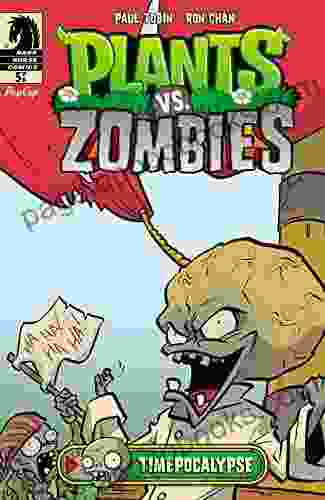
 Ben HayesJourney into the Verdant Realm of "Plants vs. Zombies: Timepocalypse" by Paul...
Ben HayesJourney into the Verdant Realm of "Plants vs. Zombies: Timepocalypse" by Paul...
 Jace MitchellUnveiling the Secrets: Dive into "Can You Keep a Secret?" by Sophie Kinsella
Jace MitchellUnveiling the Secrets: Dive into "Can You Keep a Secret?" by Sophie Kinsella Edwin CoxFollow ·3.3k
Edwin CoxFollow ·3.3k Hunter MitchellFollow ·11.2k
Hunter MitchellFollow ·11.2k Michael ChabonFollow ·14.5k
Michael ChabonFollow ·14.5k Ivan CoxFollow ·7.2k
Ivan CoxFollow ·7.2k Austin FordFollow ·8.7k
Austin FordFollow ·8.7k Cameron ReedFollow ·14.4k
Cameron ReedFollow ·14.4k Ernest HemingwayFollow ·7.2k
Ernest HemingwayFollow ·7.2k Nick TurnerFollow ·6.3k
Nick TurnerFollow ·6.3k

 Ben Hayes
Ben HayesJourney into the Verdant Realm of "Plants vs. Zombies:...
Immerse Yourself in an Epic Battle for...

 Edward Reed
Edward ReedUnveiling the Allure of Modish Crochet Hats Annie...
In the realm of fashion and...

 Jaylen Mitchell
Jaylen MitchellHalf Moon Bay: An Unforgettable Adventure Awaits in Aj...
Prepare yourself...
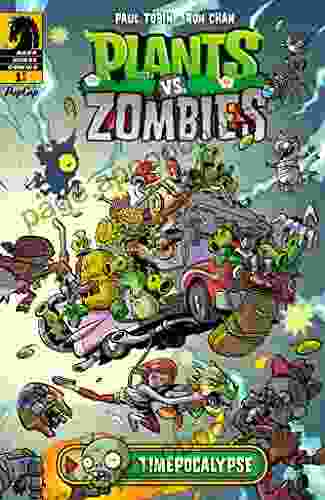
 Dan Brown
Dan BrownUnleash the Plant-Powered Apocalypse: Dive into Paul...
Prepare yourself for an epic showdown where...

 Efrain Powell
Efrain PowellStolen Summer: Nora Sommer's Enthralling Caribbean...
Escape to a World of...
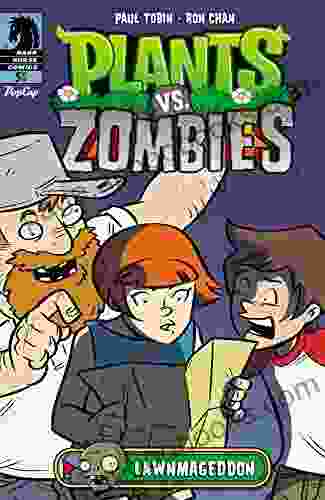
 Steven Hayes
Steven HayesPlants vs. Zombies: Lawnmageddon - The Ultimate Battle...
Prepare for the ultimate battle between plants...
5 out of 5
| Language | : | English |
| File size | : | 18005 KB |
| Text-to-Speech | : | Enabled |
| Enhanced typesetting | : | Enabled |
| Word Wise | : | Enabled |
| Print length | : | 296 pages |
| Screen Reader | : | Supported |
| Item Weight | : | 1.32 pounds |
| Paperback | : | 528 pages |
| Dimensions | : | 5.59 x 1.02 x 8.86 inches |


